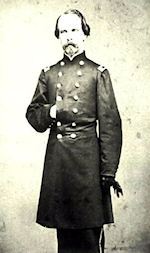. . . “The officers told us the whole story of the battle and described terrible scenes to us of cold, suffering and death by drowning which we hope to forget…
While standing on the dreadful bank where our poor wounded were dragged up (and from which we plainly saw the rebel pickets across the river gathering in a little group), we understood fully and bitterly the wicked incompetency of whoever is responsible for this blunder…
Bright and early next morning we left for Darnestown on the return drive. There Captain Best, of Battery F, 4th Regular Artillery, was our host, and a most kind and attentive one, he and the other officers turning out of their tents for us and treating us like queens. Frank Crosby turned up there as Senior 1st Lieutenant, a position, Captain Best told us quietly, he worked fourteen years for in the regular service. Our tent was the salon and round our little fire that evening gathered Captain Best, General Hamilton of Wisconsin, Major Crane, Lieutenant Hazzard of Battery A, R. I. Artillery, Colonel Stiles of the 9th N. Y., Captain Perkins, Lieutenants Muhlenberg and Crosby, Dr. Wier of the Battery and others. They all came laden with refreshments from the sutler’s, and all seemed to enjoy the fun. . . Next day we called at Fort Muggins, lunched with the General, dined with Lieutenant Hazzard of Battery A, and left for Washington. We were stopped on the way for lack of countersign and marched to Tenallytown between files of soldiers! but managed to establish our innocence, and finally reached the Ebbitt house at 8 P. M.
At Darnestown we received the first official confirmation of the success of the great expedition and the capture of Port Royal. Captain Rodgers of the navy was selected by the Commodore as the first man to go on shore and run up the Stars and Stripes; and Dr. Bacon, who was one of the party, was sent inland with General T. W. Sherman’s proclamation, issued on his own responsibility, to the citizens of South Carolina, exhorting them to “pause and reflect upon the tenor and consequences of their acts,” etc. So deserted was the whole neighborhood of all but slaves that they had to go twelve miles to find a white man to hand the proclamation to, and he took it with oaths and under protest.”





